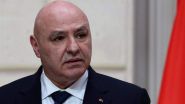
Sources familiar with the matter report that President Donald Trump is undertaking a sweeping reassessment of his administration’s inner circle ahead of the self-imposed June deadline for negotiations with Iran. The shake-up comes amid rising internal friction—particularly between Vice President JD Vance and Trump’s son, Donald Trump Jr.—and a deepening ideological divide within President Trump’s team.
At the heart of the split are two competing visions: one aligned with Israel’s push for a preemptive strike against Iran, even at the cost of US entanglement; the other committed to Trump’s “America First” doctrine, favoring diplomatic engagement and opposing new military ventures.
As part of this recalibration, Trump has named Secretary of State Marco Rubio as National Security Advisor, replacing Michael Waltz, who was dismissed and reassigned to the US Mission to the United Nations in New York, along with his deputy. Rubio has begun a major overhaul of the National Security Council, planning to reduce its 350-strong staff by half.
Meanwhile, well-informed Washington sources have outlined the administration’s key priorities in Lebanon as follows:
Foremost is the imperative to shield Lebanon from the looming confrontation between Israel and Hezbollah. To that end, Washington, in coordination with France, is pressing all parties to strictly adhere to the proposed ceasefire framework and to fully implement United Nations Security Council Resolution 1701, which calls for a cessation of hostilities and the disarmament of militias south of the Litani River.
A second objective is to distance Lebanon from Iran’s regional sphere of influence and to reaffirm the country’s longstanding policy of positive neutrality, a principle enshrined since its independence. This comes in the wake of a visit by Iranian Foreign Minister Abbas Araghchi, who publicly reiterated support for Lebanon’s sovereignty while privately emphasizing Tehran’s continued backing of Hezbollah and the so-called Obstructionist Axis—highlighting a clear gap between Iran’s diplomatic posture and its strategic ambitions.
The third pillar of US policy involves the disarmament of Hezbollah and Palestinian factions, in parallel to extending legitimate state control over refugee camps and weapons stockpiles through the Lebanese Armed Forces (LAF) and legitimate security institutions.
Economic stabilization also ranks high on the agenda. Washington urges Beirut to enact urgent financial reforms, reintegrate into the formal banking sector and dismantle the parallel “cash-based” economy which, in its current form, serves as a critical financial conduit for Hezbollah through entities like the unlicensed Al-Qard al-Hassan Foundation.
Finally, the United States encourages Lebanon to align with the broader regional momentum toward peace. In this vision, Lebanon would join the expanding circle of Arab states engaged in normalization with Israel under the Abraham Accords. US officials point to the precedent set by Syrian President Ahmad el-Chareh, who has reportedly entered into direct negotiations with Israel in Azerbaijan.
American sources acknowledge that recent developments in Lebanon constitute a deliberate message from Washington, prompted by growing frustration with Lebanese officials’ reluctance to take tangible steps. With the window of opportunity rapidly closing, the Trump administration has made it clear: Lebanon must not squander this last chance, as President Trump himself has warned.
These sources highlight troubling signs in the behavior and rhetoric of some Lebanese officials, particularly following the latest Israeli airstrike. Feeling targeted, several have defiantly declared, “We will not surrender.” Washington was also surprised by the Lebanese Army’s advance into the southern suburbs just hours before Israel struck underground facilities reportedly used to store weapons, manufacture drones and house military infrastructure. Israel had formally notified the Lebanese Army through the coordination and control committee to evacuate the area prior to the attack. According to US observers, the army should have secured these sites well before the strike.
Concerns persist over Lebanon’s failure to enforce restrictions on Hezbollah’s arsenal north of the Litani River, a zone covered by UN Security Council Resolution 1701. Lebanese authorities remain paralyzed by the intransigence of the Hezbollah-Amal alliance, which insists that the resolution does not apply to its weapons there. A senior security official privately admitted that Hezbollah refuses to cooperate with the state’s disarmament efforts, withholding critical intelligence on weapons caches, factories and tunnels from the Lebanese Army. This stance is reportedly reinforced by Iranian envoy Abbas Araghchi, who has assured Hezbollah that “the balance will shift” and that arms will remain in the hands of the “resistance.”
Meanwhile, Syria has drawn global attention by openly committing to the regional peace process, prioritizing national interests over long-standing ideological allegiances. Western diplomats speculate that Washington may reward Syrian President Ahmad el-Chareh with a symbolic White House visit and an Oval Office handshake with President Trump—a gesture intended to encourage Damascus’ continued engagement.
At the same time, there is growing concern that Israeli Prime Minister Benjamin Netanyahu—facing intense domestic political pressure and a threatened government collapse—may initiate a military campaign against Lebanon under the pretext of dismantling Hezbollah’s arsenal. With Gaza firmly under American influence and Syria enjoying de facto US diplomatic protection, Lebanon risks becoming the region’s most vulnerable flashpoint.
The critical question remains: Will Lebanon seize this moment to align with the Trump administration’s urgent push for regional peace and join the Abraham Accords? Or will it remain sidelined, hindered by its inability to enforce state monopoly over arms—missing the opportunity and paying the price alone?




Comments